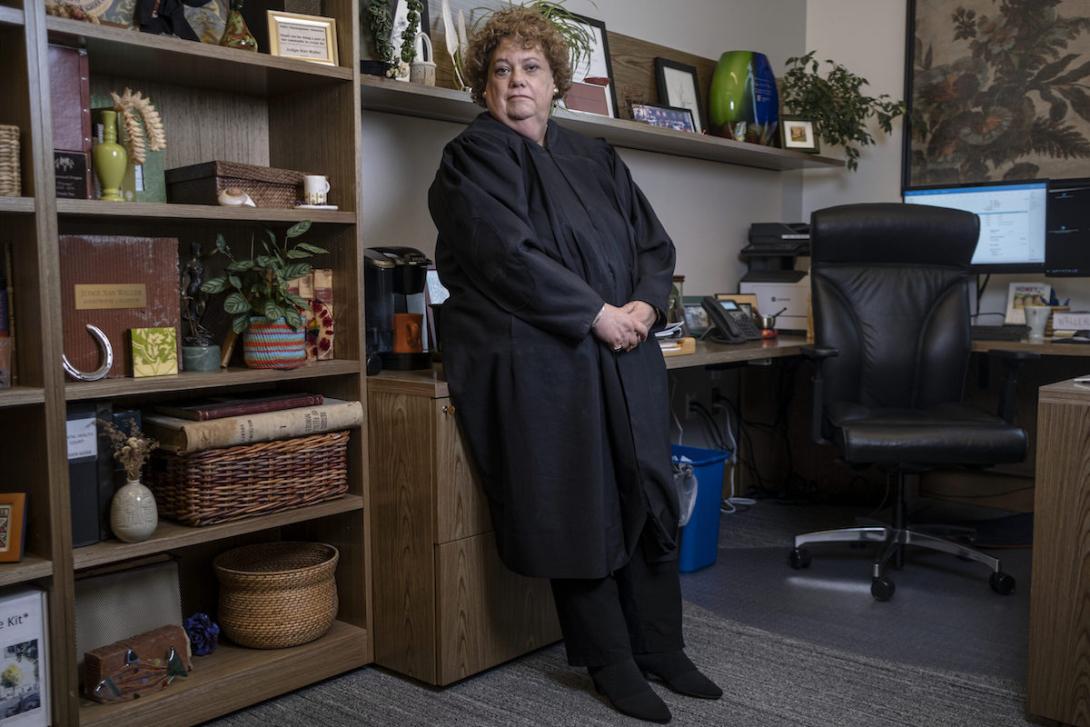
Multnomah County Circuit Judge Nan Waller once had an unorthodox request from a man in her courtroom.
He begged her tearfully to put him in jail. The Portland streets were bitter cold and he had nowhere to turn. She arranged for him to sleep on a conference room floor until her staff could find a program to help him.
Waller sits in the center of Oregon’s mental health crisis. She oversees the mental health court for the state’s largest county, a voluntary program that helps people stay in treatment, receive social services and reduce their time on probation. She also presides over competency hearings for hundreds of defendants a year to determine whether they need community programs or treatment at the Oregon State Hospital to stand trial.
These are not jobs with easy answers – for the judge or the people who stand before her in court. Oregon has a lack of counselors and treatment beds for people with mental illness. When a defendant comes before Waller, they represent the failure of Oregon’s behavioral health system to help people improve their mental health, avoid a jail cell and even prevent them from committing a crime as the state grapples with a crisis on multiple fronts.
The treatment crisis has affected the Oregon State Hospital, which is under a court order to treat people and discharge them on set deadlines so they can face criminal charges. And a fentanyl overdose epidemic is killing hundreds of Oregonians every year.
Waller agrees the state has challenges – and she says the solution starts with all of us. She encourages Oregonians to treat people in a behavioral health crisis with the same compassion they would for any other health problem.
“We’ve all seen people walking down the street who are in a crisis, and some people have their phones out, and they’re filming them because they think it’s funny,” Waller told the Capital Chronicle. “We wouldn’t if somebody were having a heart attack in the middle of the street. People will not be pulling out their phones to film; they would be calling 911 to say, ‘A person who really needs some help is here.’”
Multnomah County Circuit Judge Nan Waller presides over a hearing at the Multnomah County Courthouse on Thursday, February 9th, 2023. (Jordan Gale/Oregon Capital Chronicle)
Oregon roots
Waller, on the bench for more than two decades, is a homegrown judge.
She grew up in Portland, graduating in 1972 from Lincoln High School. After completing her undergraduate work at Stanford University in California, Waller enrolled in the University of Oregon School of Law in Eugene, graduating in 1979.
In law school, she met her future husband, Paul Bovarnick. After a three-year friendship, he asked her out for a beer at Taylor’s, a watering hole half a block from campus. The two became inseparable as they studied for the bar exam and spent time hiking and enjoying the Willamette River.
“When it came time to take the bar, we looked like we’d been outside having a great time instead of inside slaving over the various bar materials,” Bovarnick said in an interview.
After they took the bar exam, Bovarnick called for the results, with Waller by his side.
He made her wait.
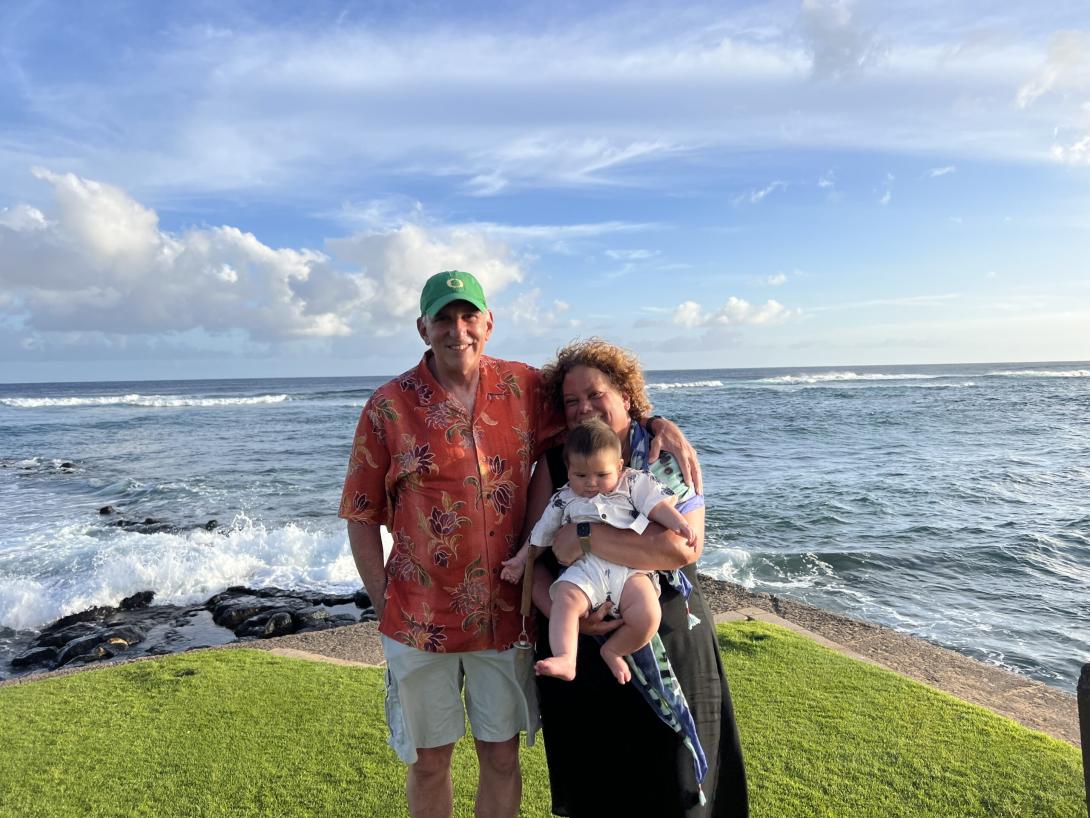
“I deliberately started asking about all of our friends, and Nan was sitting there going nuts, because she couldn’t tell whether she had passed the bar,” he said. “I tortured her for about three minutes with that and then I said, ‘Thank you very much,’ hung up.”
Then he said: “Yes, Nan, you passed the bar.”
The couple moved to Billings, Montana for their first jobs out of law school before they married in 1980. They worked for a Montana legal aid organization, representing the downtrodden and impoverished.
Bovarnick said that experience was instrumental for Waller’s career.
“That introduced Nan in a very, very up close way to what happens when systems fail people,” he said. “The people that we represented at legal services were in poverty, many of them people of color, or Native Americans, and the systems that we had did not serve them well, which is true even today.”
Waller said those cases taught her that decisions have unintended consequences. She took an unscrupulous Montana landlord to court and secured an order for him to bring his property up to code. He tore down the property instead.
In retrospect, Waller said, the young attorneys took on some tasks that were beyond their skill level. But it was a growing experience as she worked alongside other attorneys who fought for government benefits and assistance for Montana’s mistreated people.
And Waller learned to deal with difficult people, a skill any judge needs.
Early on, she faced skeptical clients set in their ways, and patriarchal judges who were unfriendly towards female attorneys.
One of her first Montana clients, Waller said, looked at her and said: “I don’t want a girl attorney.”
She had a quick response.
“That’s where I said, ‘You’re lucky. I’m not a girl anymore.”
Back to Oregon
After several years, they moved to Portland, where Waller went to work as an attorney for the Metropolitan Public Defenders, which represents defendants who lack the means to hire their own attorneys. She spent much of that five-year period working on juvenile cases.
In the 1990s, as Waller’s family grew with three children, she became a part-time juvenile court referee in Multnomah County, working with children in the courts system. Waller also served as a pro tem circuit court judge, a job that often entailed filling in for other judges.
In 2001, then-Gov. John Kitzhaber appointed her to be a full-time circuit court judge, which currently pays nearly $163,500 annually based on state law.
After working in the court’s family law division and serving as the presiding judge, Waller took over the mental health court in 2018.
She’s in charge of ensuring that criminal defendants get treated so they can aid in their defense. As a judge, she sees the acute shortage of available mental health services in communities for people before they end up in her court – and often go to the Oregon State Hospital for residential treatment.
The ideal solution is for people to get treatment in communities rather than at the state hospital. But there’s simply not enough options to meet the demands, Waller said.
“They can’t get into the level of treatment they need because they’re rejected by every program,” Waller said. “Our goal is to always keep people in the community if possible.”
But that can backfire if the person isn’t ready to be a part of society.
“The worst thing ever is when we release somebody or place them in the community in the first place, and it just doesn’t work right from the get-go,” Waller said. “They’re either discharged from the program or they leave and sometimes we’re seeing people then coming back with more serious charges, which really doesn’t help anything at all.”
One day a week, she has court hearings in the Multnomah County jail. In that setting, she sees people at their lowest point in life.
“It’s kind of an assault in every sense when you come in,” Waller said. “You can hear the anxiety and yelling, people are banging. People are talking incoherently. People are smearing their bodily waste.”
Often, people yell at Waller, not because of anger over her decisions but because of their mental state.
The jail system does as good as it can, Waller said. Yet as a professional trained to look for systemic failures, she’s candid that Oregon’s mental health system must do better.
“Is this as good as we can do? No.”
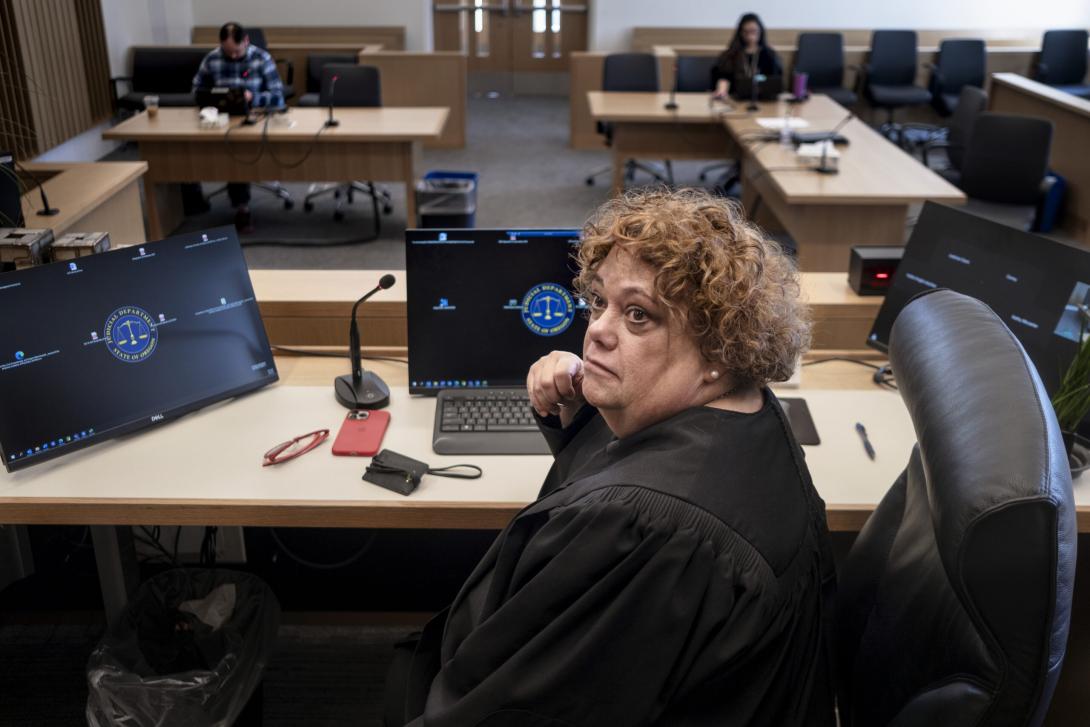
Oregon’s crisis
For the big picture, Waller points to a history that has shaped Oregon’s behavioral health landscape, dating to 1963, when President John F. Kennedy signed the Community Mental Health Act into law.
That put the United States on the path to shut down many of its notorious, large institutions that warehoused mental health patients. But the federal law, Waller said, failed to accomplish its other goal: an adequate network of community mental health services to help people.
That history alone doesn’t explain why Oregon consistently ranks at the bottom in terms of access to behavioral health treatment in national studies, she said.
“I do not understand why we are always at the bottom of the states in terms of access and our outcomes,” Waller said.
State lawmakers have noticed the problem, allocating $1.3 billion in 2021 alone for new facilities, programs and to build out the workforce for behavioral health.
Yet the results are sometimes hard to see.
“What’s happening?” Waller said. “How is it that we are in this position?”
When attending a conference, Waller said she had an informal discussion with a federal official with the Substance Abuse and Mental Health Services Administration, SAMSHA, which focuses on improving treatment access. The official said Oregon is innovative, but added that the state has a poor track record in implementing programs, Waller recalled.
“That’s haunted me ever since,” Waller said.
One of the latest examples of poor implementation, critics say, is Measure 110, which decriminalized low-level drug possession with the goal of expanding access to programs and services for addicts. Waller said some defendants think the measure allows them to still do drugs while on probation. But probation orders can require people to stay away from controlled substances that affect their behavior, including drugs and alcohol.
“I’ve had people tell me, ‘What do you mean, I can’t use meth? It’s legal for me to use meth,’” Waller said. “I don’t think, ever the message intended with Measure 110. But that’s certainly the takeaway that some people have gotten. And that is really unfortunate.”
Waller said the impact of meth and fentanyl is acute, and the mental health court gets notices when clients need to be revived with naloxone, which reverses overdoses.
“That’s terrifying,” Waller said. “It’s just so available. And it’s really hard to deal with people’s mental health.”
Waller admits she doesn’t have the answers to Oregon’s crisis. She is, however, concerned about limited access in the state to mental health and addiction treatment.
“We have people that just get turned down by every program and then it’s ‘Okay we have the street,’ and that’s exactly what’s part of the predicament that we find ourselves in,” Waller said. “The community, understandably, is unhappy when they see people who are clearly struggling.”
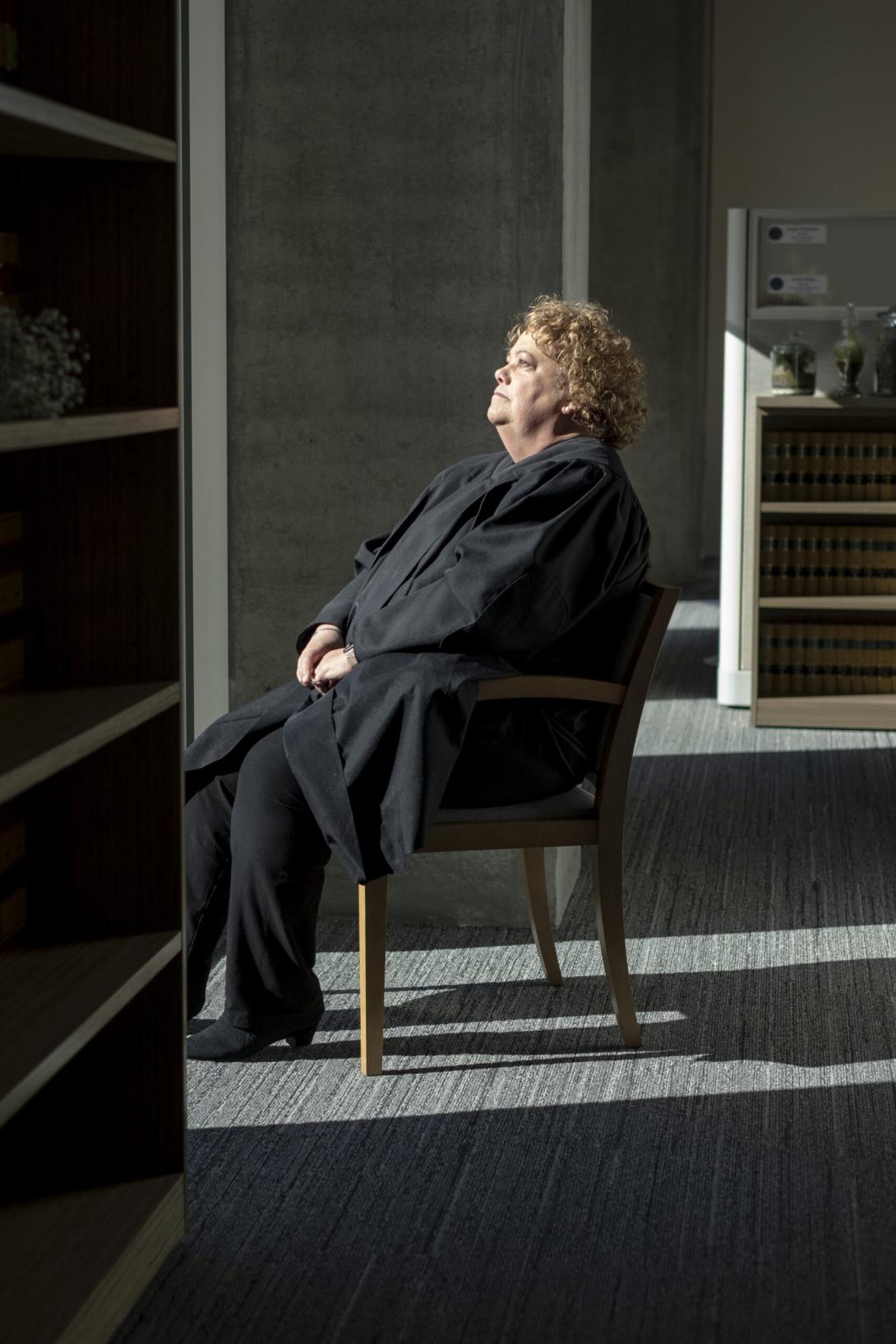
A refuge
Laura Cohen worked with Waller as her mental health court coordinator during the pandemic. The mental health court helps people with mental health conditions on probation access services, stay on their medication and avoid arrest. The intensive program has weekly meetings. Those who successfully finish the program can get their probation time reduced.
Cohen said clients in the program often showed up – even when they didn’t have a court date because she’s welcoming.
Through her, they learned that court can be a safe space.
“I think it’s a really telling, illustrative sign that we have people who, for all intents and purposes, should be terrified of the criminal justice system and wouldn’t want to come into a courthouse and yet found themselves over and over again, coming into Judge Waller’s courtroom,” she said.
In any courtroom, people work behind the scenes on cases: attorneys, social workers, law enforcement and clerks.
But the judge is central.
“There’s a whole team of people that do the work right, but at the end of the day, it’s the person in the black robe that has the most impact,” Cohen said.
Waller is willing to learn and try new things. At one point, she visited a mental health court in Houston, where Cohen previously worked, to see how that jurisdiction ran its court.
Waller also helps shape policies through committee work on a variety of state and national advisory boards and task forces, offering input about behavioral health and court-related issues.
Waller helped the state plan its electronic court filing system, and she helped secure state funding for a new Multnomah County Courthouse by speaking to lawmakers.
Waller also co-chairs the Chief Justice’s Behavioral Health Advisory Committee, which Chief Justice Martha Walters set up to come up with ideas for mental health and the courts system.
In 2022, Walters penned a letter nominating Waller for the William H. Rehnquist Award, a national distinction for judges named after the late U.S. Supreme Court justice.
“Judge Waller makes a difference one vulnerable child, teen, or adult at a time – providing a bridge, and often a lifeline, that brings the potentially impersonal justice system down to a human level with compassion, listening, legal expertise, and a commitment to equity and justice,” Walters wrote in the nomination letter.
Waller received the award in October.
In an interview, Walters said Waller represents a newer breed of judge.
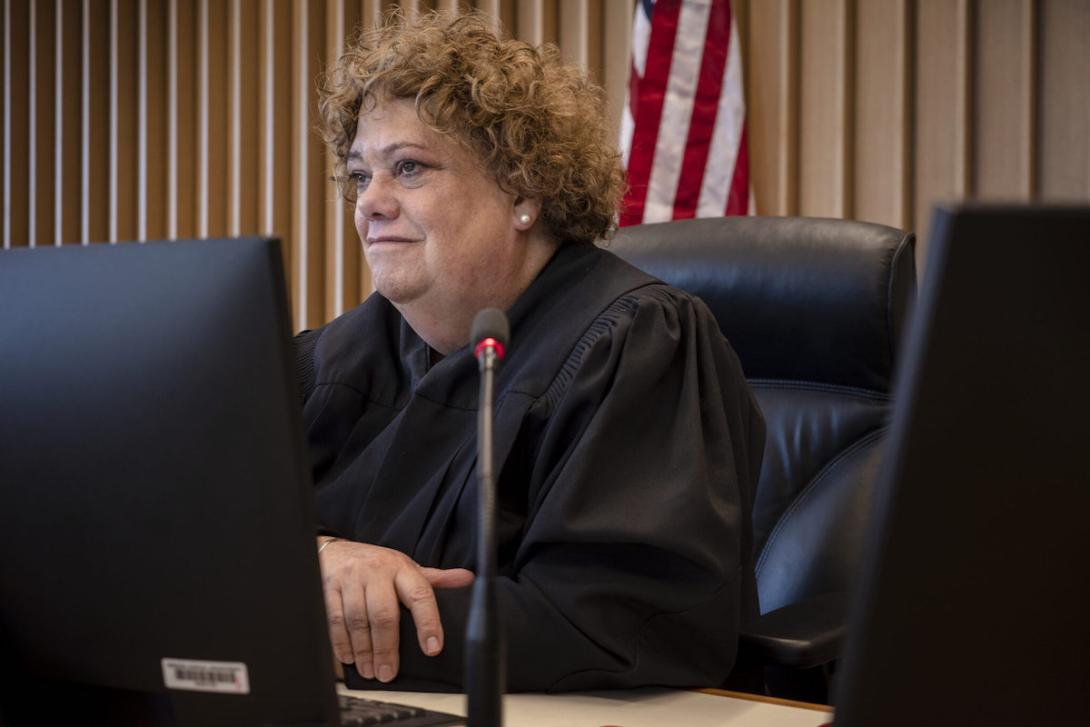
“The judges have changed since when I first came into the court and thinking about their role as not just sitting up on the bench and saying, ‘Your motion is granted or denied,’” Walters said. “You know, there’s a lot more that we’re trying to do to help people really resolve their problems. And I think we’ve seen Judge Waller’s willingness to get in there and figure out okay, what do these people really need?”
Others agree.
Matthew Donohue, a circuit court judge in Benton County, works with Waller on the behavioral health advisory committee. He said she is cognizant of the big picture and wants to involve all affected parties into policy conversations.
“The one thing about Judge Waller is she’s pretty much tireless,” Donohue said.
Waller laments the lack of resources in Oregon to help people who come before her, like the man who asked for a jail cell for shelter.
“That’s the part that just breaks my heart,” Waller said. “Somebody’s showing up every week. But you don’t have anything to offer except: ‘Keep on coming.’ We’re really trying.”
The courtroom keeps her grounded in the reality that people are behind the numbers. She sees them everyday – and asks for a word to describe their goals.
Often, they pick words like “stability” and “health.”
When asked for her word, one day, Waller replied: “Resolved. I am resolved to make sure that you get what you need.”
An excellent artice!